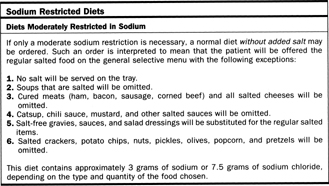Nutrition and Weight Control - Underweight
Weighing too little is a problem that is considerably less common than weighing too much. In fact, in many cases, it isn't accurate to call it a problem at all, at least not a medical one.
There are some times, however, when underweight may indicate the presence of a disease, especially when a person rather suddenly begins and continues to lose weight, even though there has been no change in his eating habits. This is a situation that calls for prompt medical evaluation. Fortunately, such a person may already be under a physician's care at the time the weight loss is first noticed.

| Diets Moderately Restricted in Sodium | |||||||
|---|---|---|---|---|---|---|---|
| If only a moderate sodium restriction is necessary, a normal diet without added salt may be ordered. Such an order is interpreted to mean that the patient will be offered the regular salted food on the general selective menu with the following exceptions: | 1. No salt will be served on the tray. | 2. Soups that are salted will be omitted. | 3. Cured meats (ham, bacon, sausage, corned beef) and all salted cheeses will be omitted. | 4. Catsup, chili sauce, mustard, and other salted sauces will be omitted. | 5. Salt-free gravies, sauces, and salad dressings will be substituted for the regular salted items. | 6. Salted crackers, potato chips, nuts, pickles, olives, popcorn, and pretzels will be omitted. | This diet contains approximately 3 grams of sodium or 7.5 grams of sodium chloride, depending on the type and quantity of the food chosen. |
More often, however, underweight is a chronic condition that is of concern to the person who feels his looks would improve if he could only add some extra pounds. This is especially true in the case of adolescent girls and young women.
What To Do About
Weighing Too Little
Chronic underweight is rarely a reflection of underlying disease. It is rather an expression of individual heredity or eating patterns, or a combination of both. Treatment for the condition is the opposite of the treatment for overweight. The achievement of a positive caloric balance comes first; more calories have to be consumed each day than are expended. An underweight person should record his food history over a two-week period in the manner described for an overweight one. Once this has been done, various adjustments can be made.
First of all, he should see that he eats at least three meals a day and that they are eaten in a leisurely way and in a relaxed frame of mind. All of the basic foods should be represented in the daily food intake, with special emphasis on protein and complex carbohydrates. The daily caloric intake should then be gradually increased at each meal and snacks added, so long as the snacks don't reduce the appetite at mealtimes.
Carbohydrate foods are the best ones to emphasize in adding calories. Since the extra food intake may cause a certain amount of discomfort, encouragement and support from family and friends can be extremely helpful. Just as there may be psychological blocks against losing weight, there may well be a complicated underlying resistance to adding it.
Anyone trying to gain weight should remain or become reasonably active physically. Adding a pound or two a month for an adult—and a little more than that for a growing youngster—is an achievable goal until the desired weight is reached. When this happens, there will probably have to be some adjustments in eating and exercise patterns so that a state of caloric balance is achieved.

Comment about this article, ask questions, or add new information about this topic: